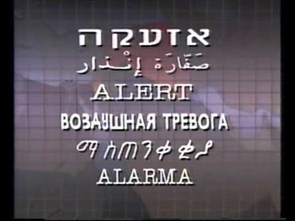The story behind the military radio station that played almost nothing:
The year is 1990 and the State of Israel is facing a new threat - the threat of chemical warfare. The IDF no longer has to protect only the country’s borders, but also the home front - the civilians who live in the heart of Israel. Whenever an alarm is sounded, civilians must run to their shelters and protect themselves from possible attacks from enemy forces. Israeli citizens know that if they aren’t paying attention 24/7, they might not hear the alarm - something that could be especially dangerous. Professor Peretz Lavie, former head of the Sleep Research Laboratory at the Technion and current chairman of the National Council for Civilian Research and Development, collaborated with the Israel Defense Forces and the Israel Broadcasting Authority to create the "Quiet Wave" radio station - the radio station that gave peace of mind to the citizens of the State of Israel.
The "First Gulf War" as it is known in Israel, "Operation Desert Shield" as it is known in the United States, or “The Mother of All Wars” as Saddam Hussein called it at the time, began 30 years ago today (17.1). In this war, 34 countries joined forces in a war against Saddam Hussein and the Iraqi army. Though Israel was not a member of the US-led coalition, the Iraqi army attacked Israel and fired almost 40 missiles at densely-populated areas. The missiles, which targeted areas with large Jewish populations, affected the reality on the ground, especially because there was grave concern that the Iraqi army would launch chemical weapons attacks.
Each time a missile was fired at Israel, an alarm was activated in the relevant areas. Citizens had to run to a sealed bomb shelter in their house that they were instructed by the government to prepare in case of an attack. There, they had to wait until danger passed, all the while equipped with gas masks and Atropine syringes. This was the first time in Israeli history that there was a real threat of nuclear warfare - both at the security level and on the public level. Following the decision of the Iraqi Army to target innocent civilians, Israelis feared for their lives and for the lives of those close to them.
An Israeli Family in a sealed bomb shelter during the Gulf War
A team of researchers from the Sleep Research Laboratory at the Technion in Haifa discovered that during the war about 30% of the Israeli population suffered from sleep disorders due to the missile threat.
"Because the missile attacks on Israel were during the night, there was critical anxiety that caused sleep disturbances, difficulty falling asleep, and in many cases a sensible choice to stay awake all night. The residents were afraid that the alarms would not wake them up from their sleep, which would prevent them from reaching the sealed room in time and using the protective equipment," explained Professor Peretz Lavie, head of the Laboratory for Sleep Research at the time.

Damage from rockets in Tel Aviv (Picture by Noam Wind)
“The problem was particularly relevant to people who lived far from the alarm devices. I was one of them as well. One day we sat in the lab, with a research fellow named Professor Ehud Klein, discussed it, and started thinking about creating a reality where a person could go to sleep knowing with confidence that if there would be an alarm in the middle of the night he or she would wake up on time and get to the sealed room - this is how the idea of the ‘Quiet Wave’ was born.” Professor Lavie, in collaboration with the IDF and the Israel Broadcasting Authority, initiated the "Quiet Wave" - a radio station that played nothing except for two words that warned of a missile attack - “Viper Snake”, “Nahash Zefa” in Hebrew.
“This way, any citizen could turn on the radio channel on full volume without hearing anything but an alarm at the moment of assault. Thus, we gave the citizens a sense of security, knowing that they could sleep peacefully without fearing missing an alarm,” said Professor Lavie. “Quite a few people wrote to us that the invention changed their lives, that they felt they could go back to sleep peacefully.”

An alert on Israeli television warning of an attack
The Gulf War brought about a significant change in the IDF as well. “I think the war gave the IDF the understanding of how important the public response is during emergencies like this. It is important to make citizens feel safe,” Professor Lavie concluded, "we can see this even today during the Corona pandemic when it is always necessary to find ways to increase the confidence of the citizens”.
The "Quiet Wave" radio station was used by the State of Israel and the IDF many times even after the end of the Gulf War. The station was restored during the Second Lebanon War, Operation Cast Lead, Operation Pillar of Defense, and Operation Protective Edge. The IDF has taken on the mission of defending the home front - this can also be seen today in the many activities that the IDF carries out that maintain the security of the residents during the Corona pandemic. The IDF understands that the task of protecting the country's citizens is as important, to say the least, as the task of protecting its territories, and the IDF is making its best efforts to successfully carry out these two important missions at the same time.

